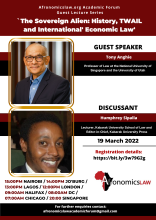Ghana Seeks International Arbitration under UNCLOS over Maritime Boundary Dispute with Togo
The Government of Ghana has formally notified the Government of Togo of its decision to initiate international arbitration under the United Nations Convention on the Law of the Sea (UNCLOS) in order to resolve their dispute over maritime boundary in the Gulf of Guinea. In a statement released on 20 February 2026, the Government indicated: “This follows attempts at negotiating a boundary which have gone on for eight years but have not resulted in an agreed outcome”.
